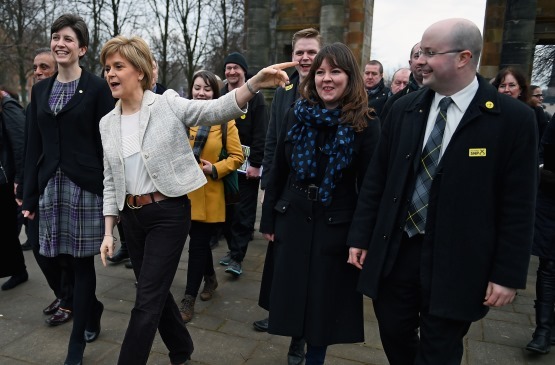
THE SNP will continue to bank tens of thousands of pounds a year from the taxpayer for the two scandal-hit MPs no longer in its ranks, The Sunday Post can reveal.
The party’s landslide victory in last May’s General Election saw it qualify for more than £1 million a year of taxpayers’ cash to support its parliamentary activities.
The payment, known as Short Money, is calculated by the number of seats and votes a party won, regardless of how many MPs it has each year.
This means that even though Michelle Thomson and Natalie McGarry both of whom are fighting allegations of financial irregularities are currently not in the SNP, the party is still benefiting from their election victories.
 Natalie McGarry is the former SNP MP for Glasgow East (PA Archive)
Natalie McGarry is the former SNP MP for Glasgow East (PA Archive)
The Short Money for the Edinburgh West MP Thomson and Glasgow East MP McGarry works out at more than £200,000 for the five-year parliamentary term.
Critics last night called on the SNP to turn down the funding while Scottish Green MSP Patrick Harvie said the rules needed to be redrawn.
He said: “Financial support for opposition parties, which don’t have the resources of the civil service to call upon, is an important part of a fair democratic system.
“The element which relates to votes should be about the election result.
“However, if an MP resigns or is expelled from a party, it seems only reasonable to reduce the ‘per seat’ element.”
Short Money is named after former minister Edward Short, who drew up the system in 1974 to compensate opposition parties for not having access to Whitehall resources.
It pays for work such as researching alternative policies to the Government of the day.
Securing 56 of Scotland’s 59 seats has seen the SNP’s share of Short Money jump from around £100,000 a year to just over £1 million.
However, George Osborne was accused of “attacking democracy” last week when he announced a 19% cut across the board to Short Money but no such cut for Government advisers.
The Lords is also not having its taxpayer-funded support money cut by the Chancellor with the £1m-a-year pot for unelected peers last night dubbed a “plush fund” by SNP MSP James Dornan.
Natalie McGarry withdrew from the SNP whip last week amid a police investigation over apparent discrepancies in money raised for a
pro-independence campaign fund. Yesterday it was claimed Miss McGarry is still waiting for full details of the allegations to be put to her.
In September, Michelle Thomson also withdrew from the party after a separate Police Scotland probe was launched into alleged irregularities with property deals.
Both MPs deny any wrongdoing.
Eben Wilson of campaign group Taxpayer Scotland said: “If the SNP were true to their own ethics they would turn down the allocated funds or at least put them in escrow (held by a third party)until the fate of the two MPs involved is worked out.”
A House of Commons spokeswoman said: “Short Money funds the parliamentary staff and activities of the party itself, not its individual members.
“Short Money allocations throughout a parliament are based on the results of the previous General Election.”
An SNP spokesman said: “The SNP group at Westminster receives Short Money due to being Westminster’s third party following our landslide victory in Scotland at the General Election.”

Enjoy the convenience of having The Sunday Post delivered as a digital ePaper straight to your smartphone, tablet or computer.
Subscribe for only £5.49 a month and enjoy all the benefits of the printed paper as a digital replica.
Subscribe